Employment Letter Samples
-
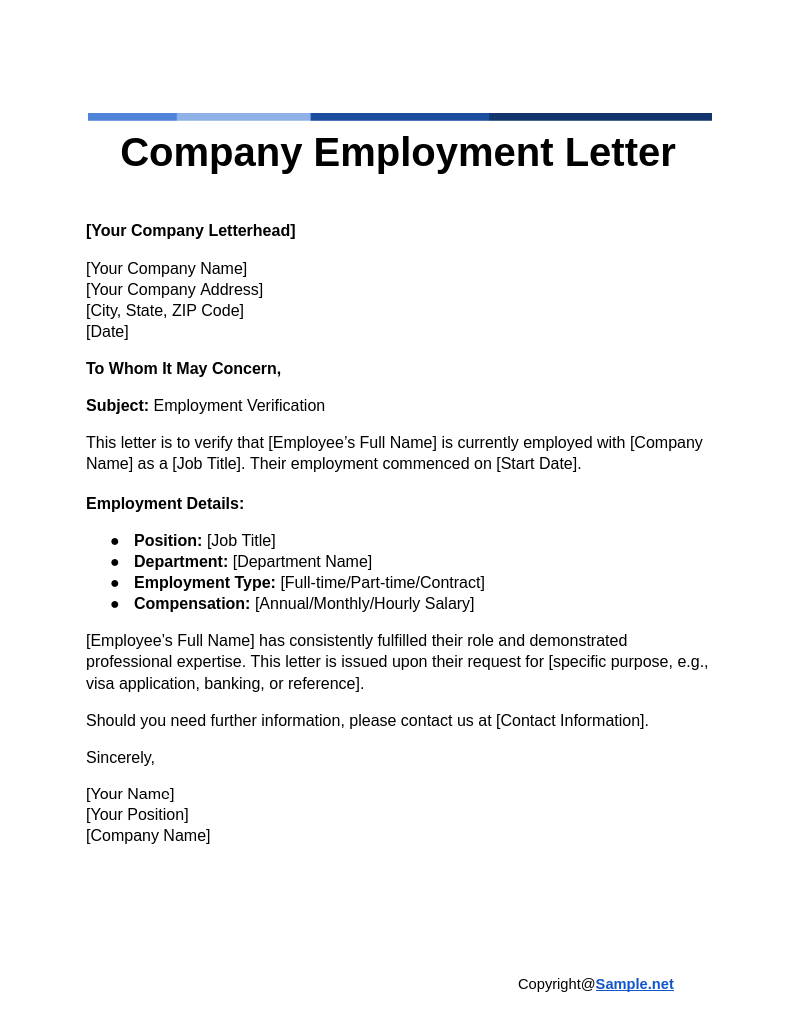
Company Employment Letter
download now -
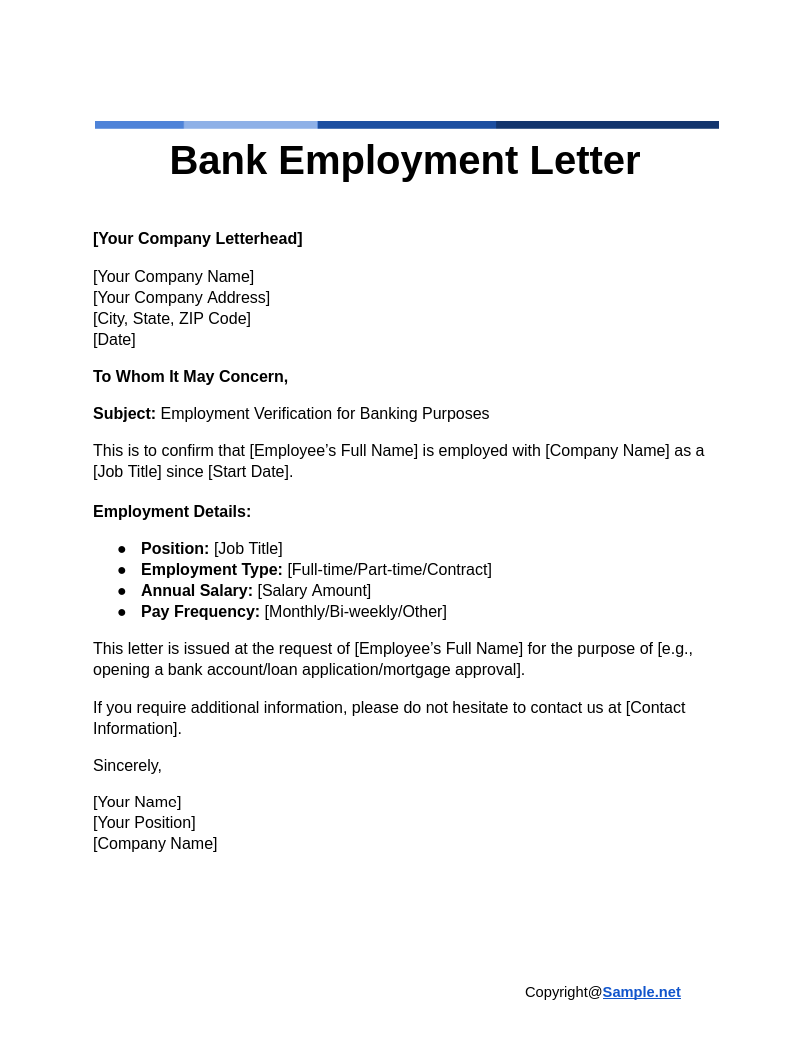
Bank Employment Letter
download now -
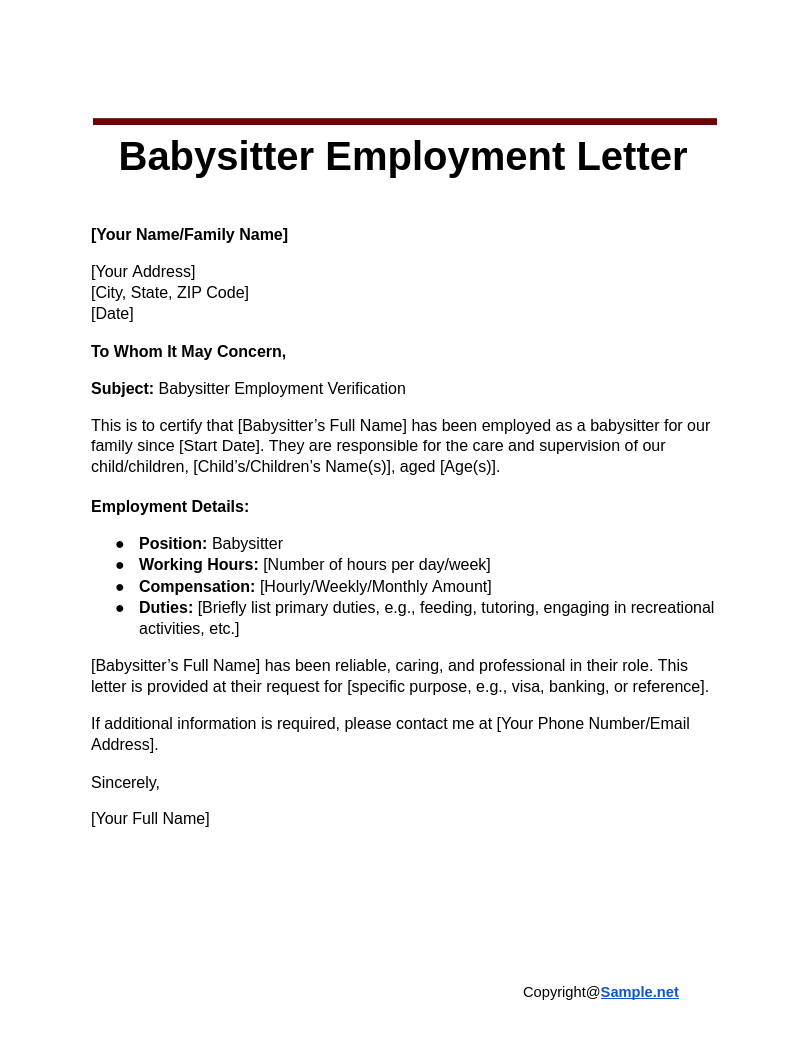
Babysitter Employment Letter
download now -
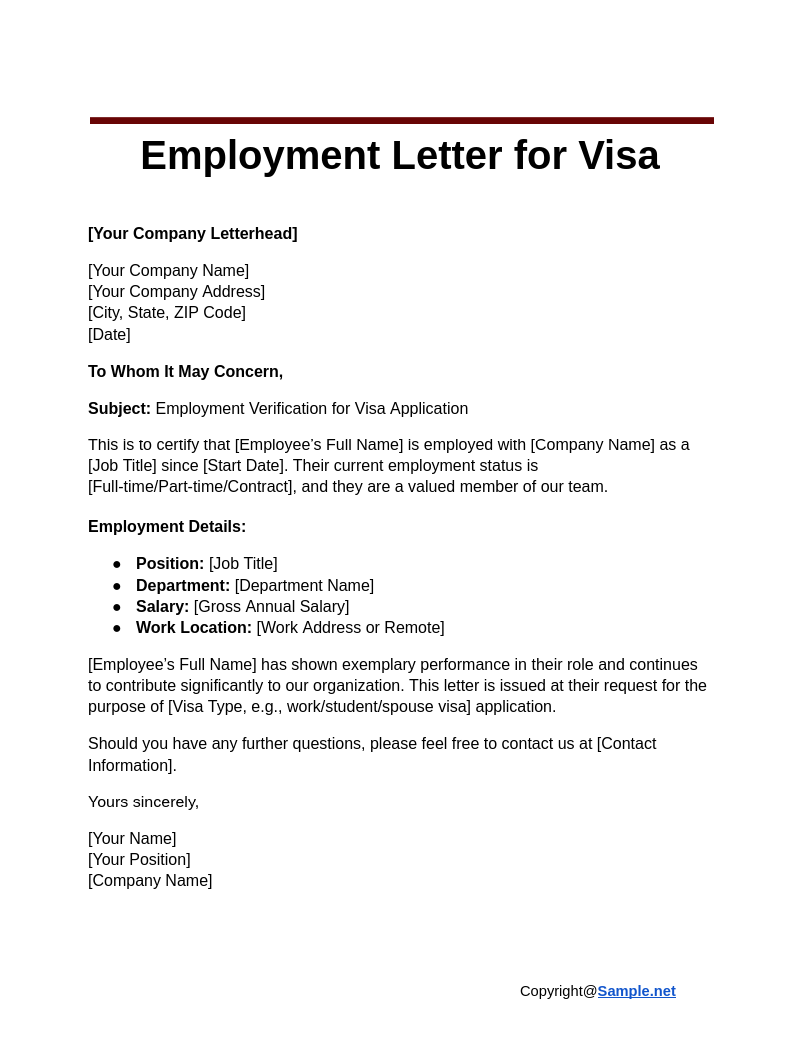
Employment Letter for Visa
download now -
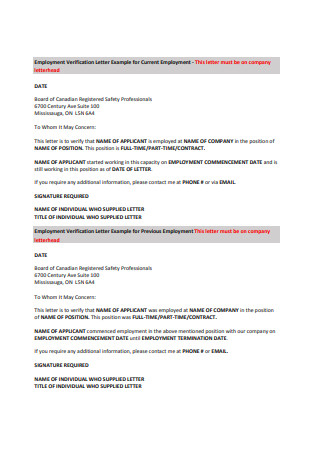
Employment Verification Letter
download now -
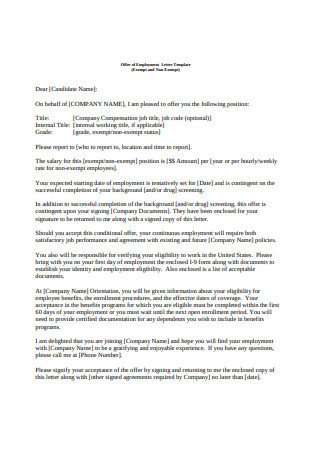
Sample Offer of Employment Letter
download now -
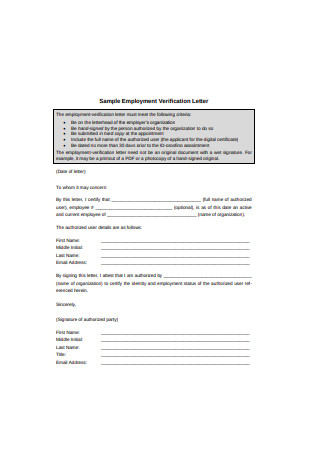
Sample Employment Verification Letter
download now -
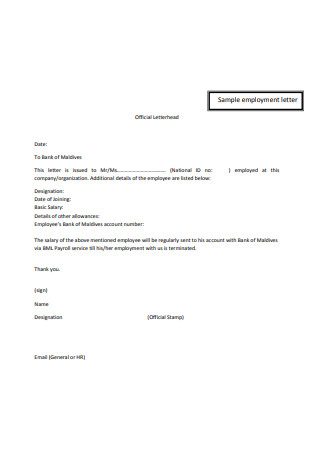
Employment Letter Format
download now -
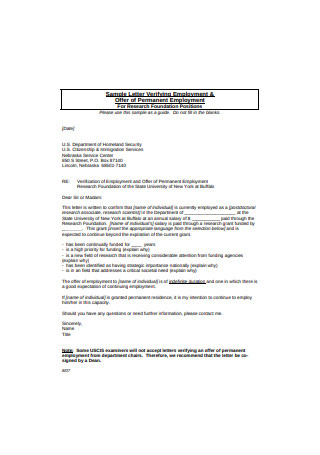
Sample Letter Verifying Employment
download now -
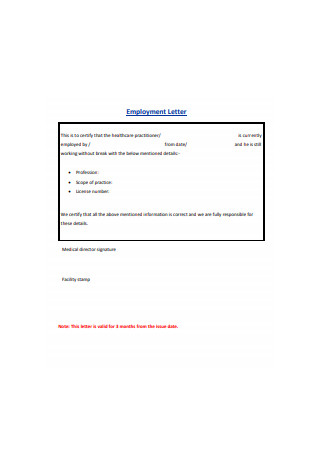
Employment Letter Example
download now -
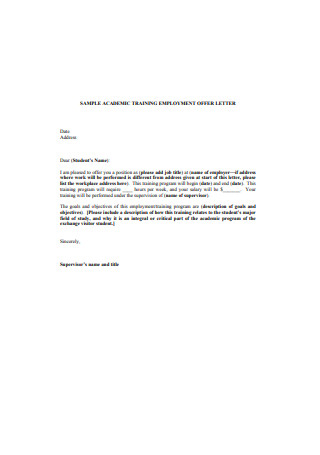
Sample Academic Training Employment Offer Letter
download now -
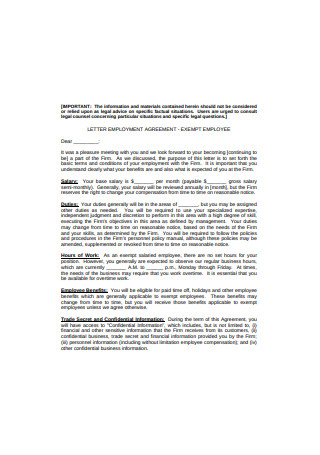
Letter Employment Agreement
download now -
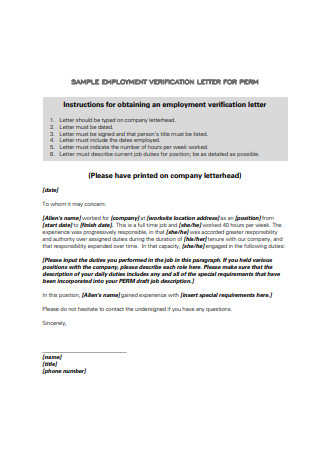
Employment Verification Letter Format
download now -
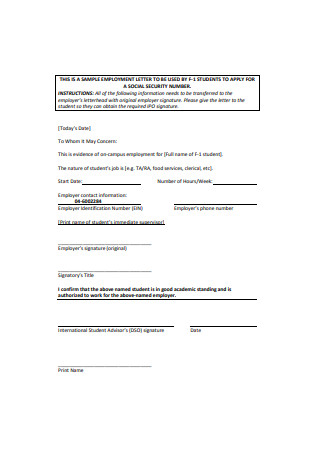
Employment Letter Sample
download now -
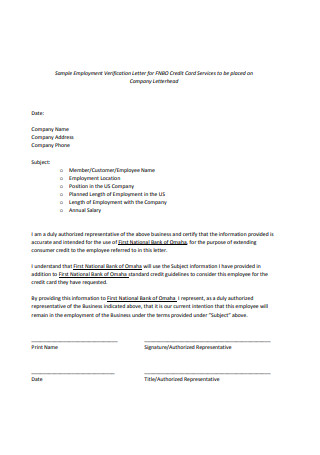
Sample Employment Verification Letter Example
download now -
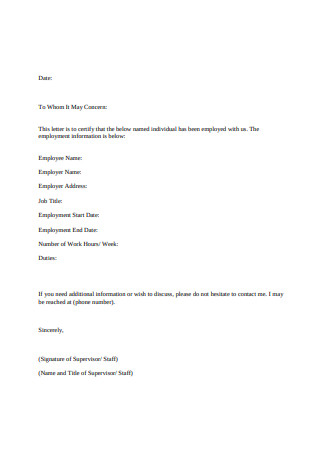
Basic Employment Letter
download now -
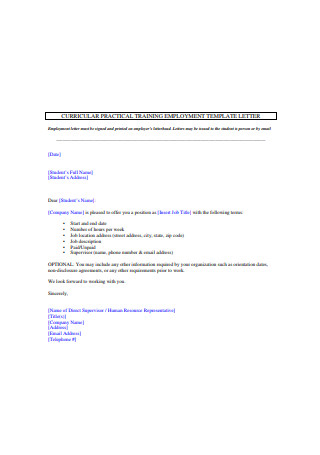
Training Employment Letter Format
download now -
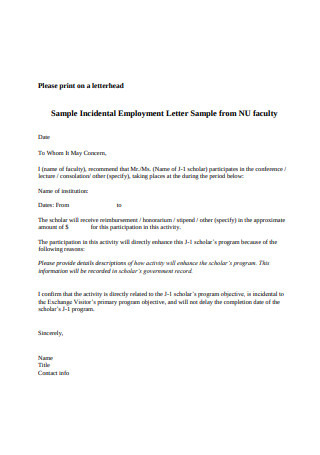
Sample Incidental Employment Letter
download now -
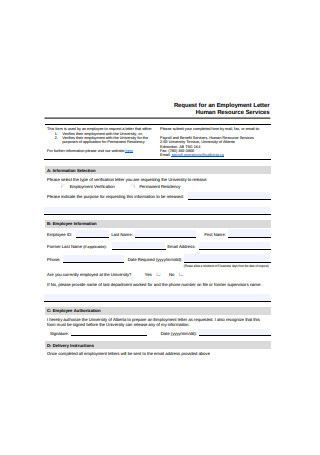
Standard Employment Letter
download now -
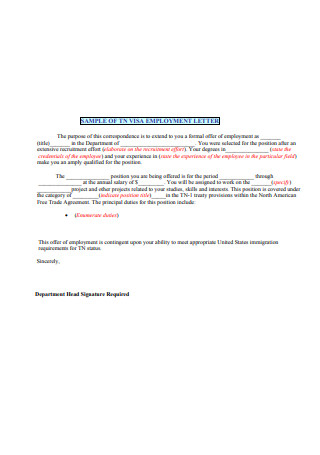
Basic Employment Letter Format
download now -
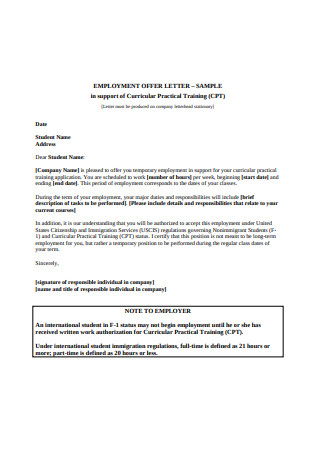
Formal Employment Offer Letter
download now -
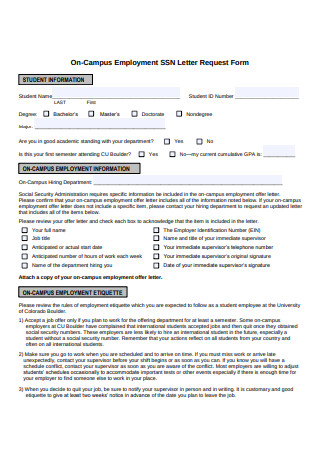
Employment Letter Request Form
download now -
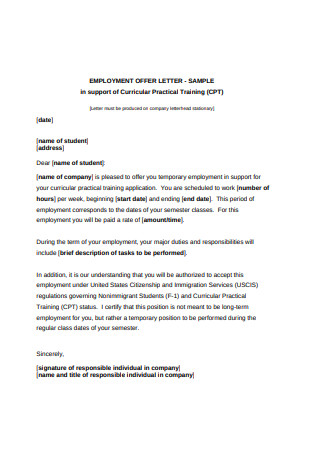
Basic Employment Offer Letter Format
download now -
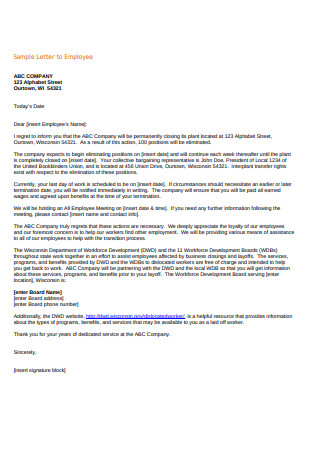
Sample Letter of Employee
download now -
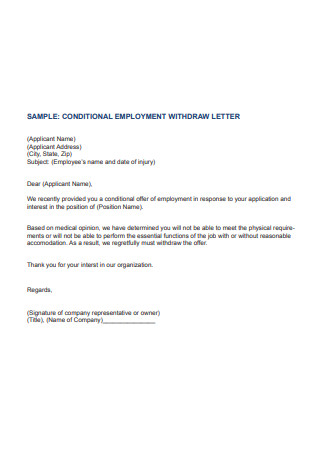
Employment Withdraw Letter
download now -
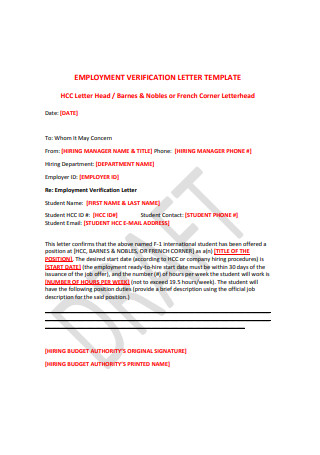
Standard Employment Verification Letter
download now -
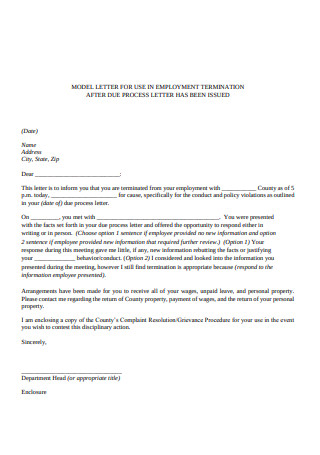
Employment Termination Letter
download now -
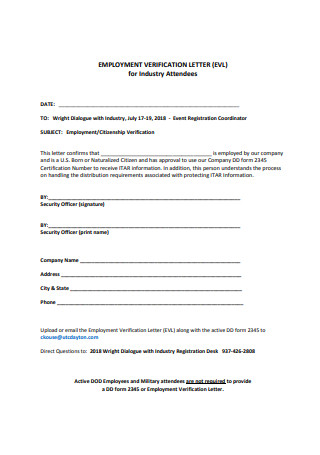
Basic Employment Verification Letter
download now -
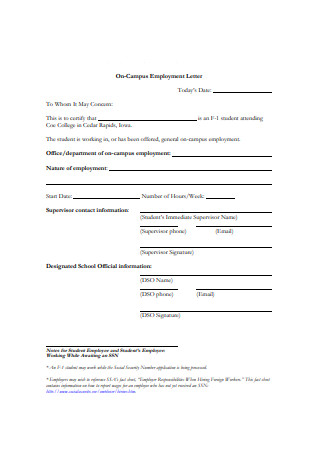
On-Campus Employment Letter
download now -
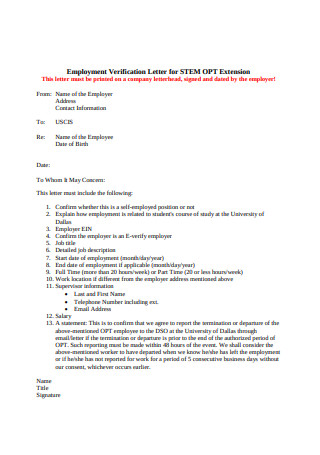
Employment Verification Letter Example
download now -
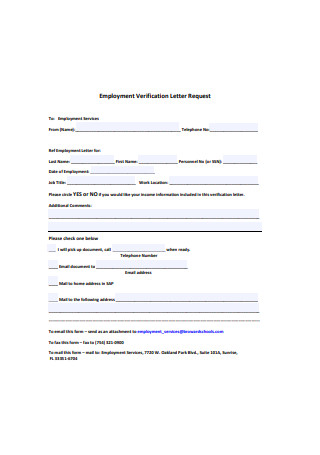
Employment Verification Letter Request
download now -
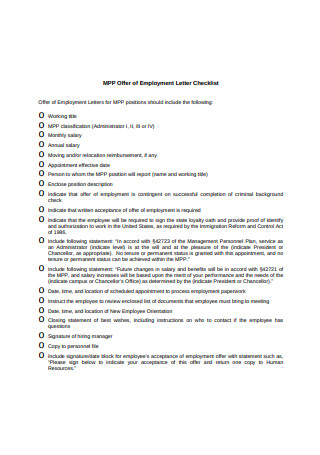
Employment Letter Checklist
download now -
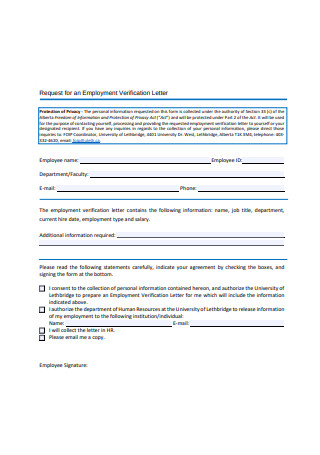
Request for an Employment Verification Letter
download now -
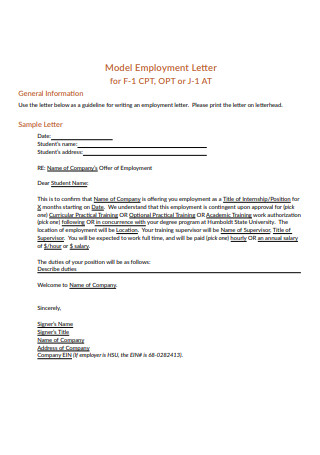
Model Employment Letter Sample
download now -
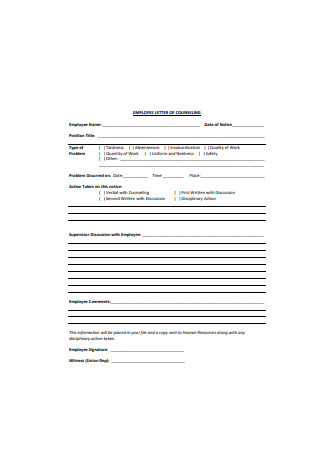
Employment Letter of Counseling
download now -
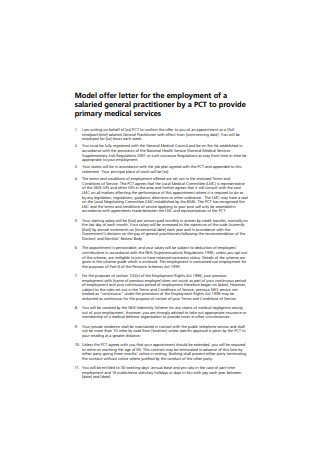
Model offer letter for the Employment
download now -
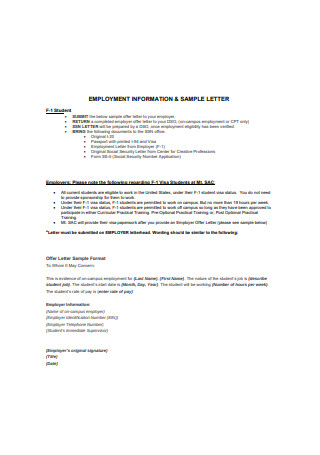
Employment Information Letter
download now -
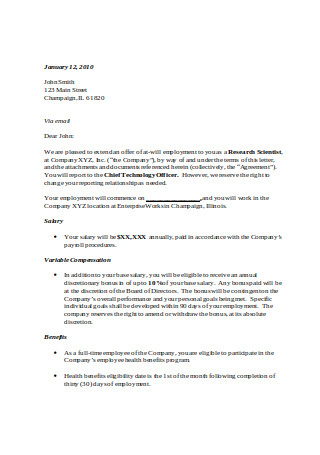
Employment Offer Letter Example
download now -
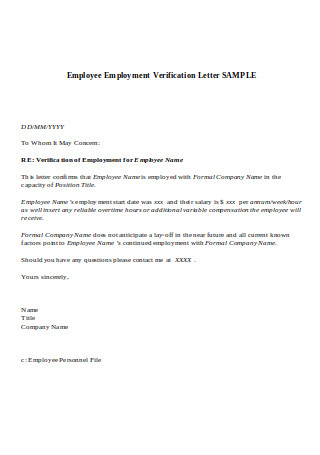
Sample Employment Verification Letter Format
download now -
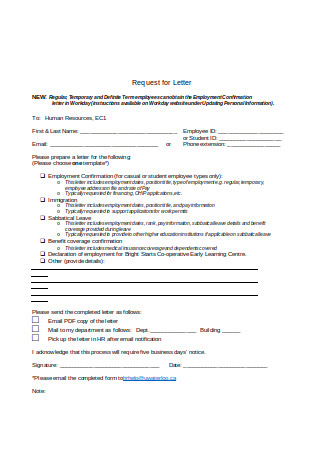
Request for Employment Letter
download now -
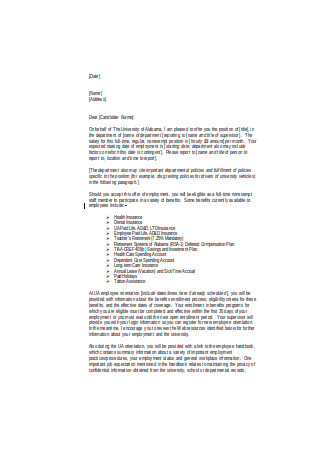
Basic Employment Letter Example
download now -
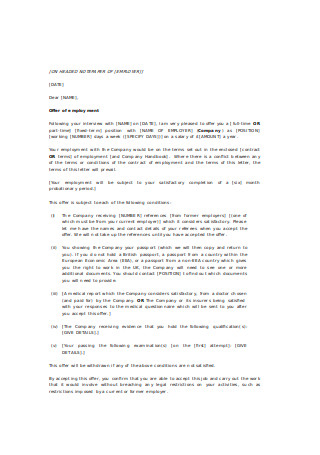
Offer of Employment Letter
download now -
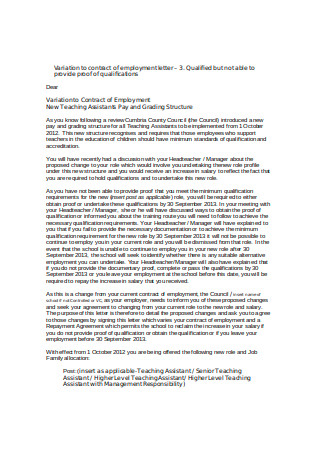
Standard Employment Letter Format
download now -
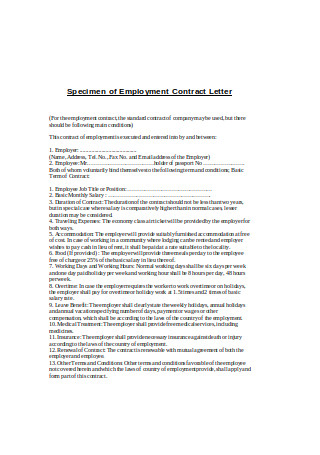
Specimen of Employment Contract Letter
download now -
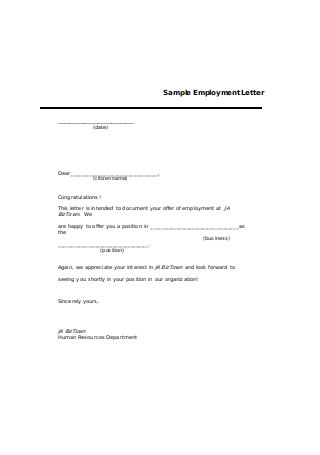
Sample Employment Letter Example
download now
FREE Employment Letter s to Download
Employment Letter Format
Employment Letter Samples
Defining Employment Letters
Why Is it Necessary?
How Does It Differ from a Background Check or Reference Letter?
When Do You Write an Employment Letter?
How Do You Construct a Good Employment Letter?
FAQS
What details are included in an employment letter?
Why is an employment letter legally important?
What should I do if there’s an error in my employment letter?
Can an employment letter be used as evidence in disputes?
How long should an employer keep copies of employment letters?
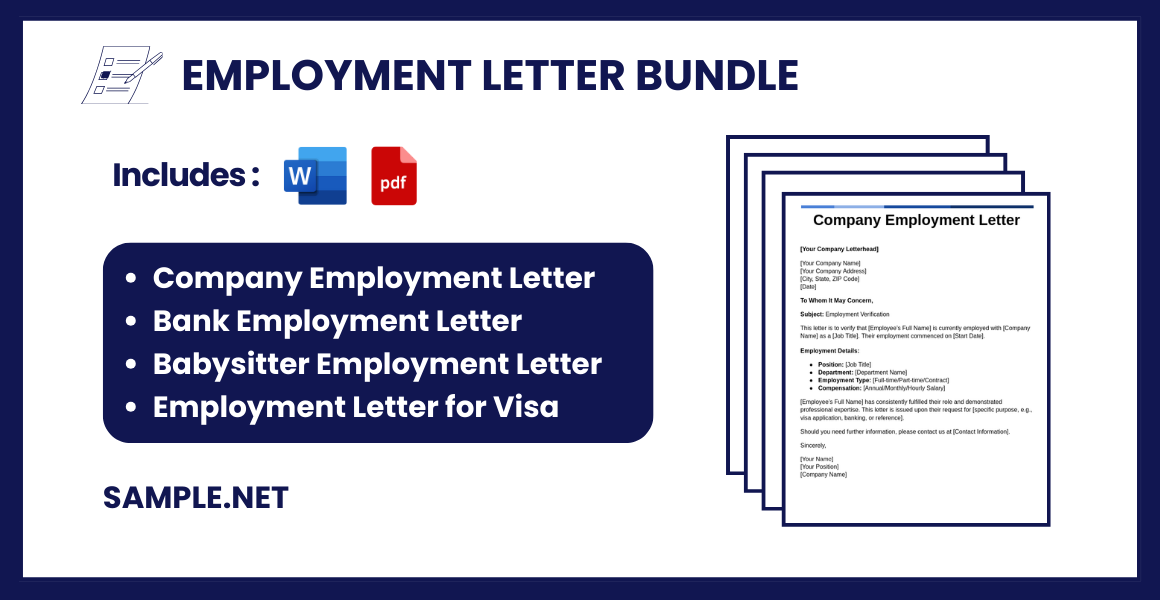
Download Employment Letter Bundle
Employment Letter Format
[Your Company Letterhead]
[Your Company Name]
[Your Company Address]
[City, State, ZIP Code]
[Date]
Employment Letter
To:
[Recipient’s Name]
[Recipient’s Address]
[City, State, ZIP Code]
Subject: Offer of Employment
Dear [Recipient’s Name],
We are pleased to offer you the position of [Job Title] at [Company Name], commencing on [Start Date], subject to the terms and conditions outlined in this letter.
Job Details:
- Position Title: [Job Title]
- Department: [Department Name]
- Reporting To: [Manager or Supervisor Name]
- Work Location: [Work Address or Remote, if applicable]
- Employment Type: [Full-time/Part-time/Temporary/Contract]
Compensation and Benefits:
- Salary: Your gross annual salary will be [Salary Amount], payable in accordance with the company’s standard payroll schedule.
- Benefits: You will be entitled to [list benefits, e.g., health insurance, retirement plans, paid time off].
Terms and Conditions:
- Probation Period: [Duration of probation period, if applicable].
- Working Hours: [Specify working hours, e.g., 9 AM to 5 PM, Monday to Friday].
- Performance Reviews: Your performance will be reviewed periodically as per company policy.
- Termination Policy: This offer is subject to [notice period, termination clauses, or conditions].
Confidentiality and Non-Compete:
You are required to adhere to the company’s confidentiality and non-compete policies, as outlined in the [attached agreement/company handbook].
Acceptance of Offer:
Please confirm your acceptance of this offer by signing and returning a copy of this letter by [Deadline Date].
We look forward to welcoming you to the team and are confident you will make a valuable contribution to [Company Name].
If you have any questions, feel free to contact [Contact Person’s Name and Position] at [Contact Number/Email].
Yours sincerely,
[Your Name]
[Your Position]
[Company Name]
Acknowledgment and Acceptance
I, [Recipient’s Name], accept the employment offer as outlined above. I understand and agree to the terms and conditions of my employment.
Signature: __________________________
Date: __________________________
Defining Employment Letters
We define an employment letter as a type of business correspondence that provides information about a person’s employment status with a company. Employers often use these letters to confirm a current or former employee’s professional arrangement with the company, as well as other concerns that the third-party entity may want you to verify. The document may even include specific information you can use to identify an individual, such as a person’s date of birth and social security number. It’s an important sample form of communication between an employer and a prospective employer or third party to help validate a claim, while also documenting the exchange for legal purposes. And to help determine the legitimacy of the letter, one of the most important components to look for is the signature of the employer’s authorized representative.
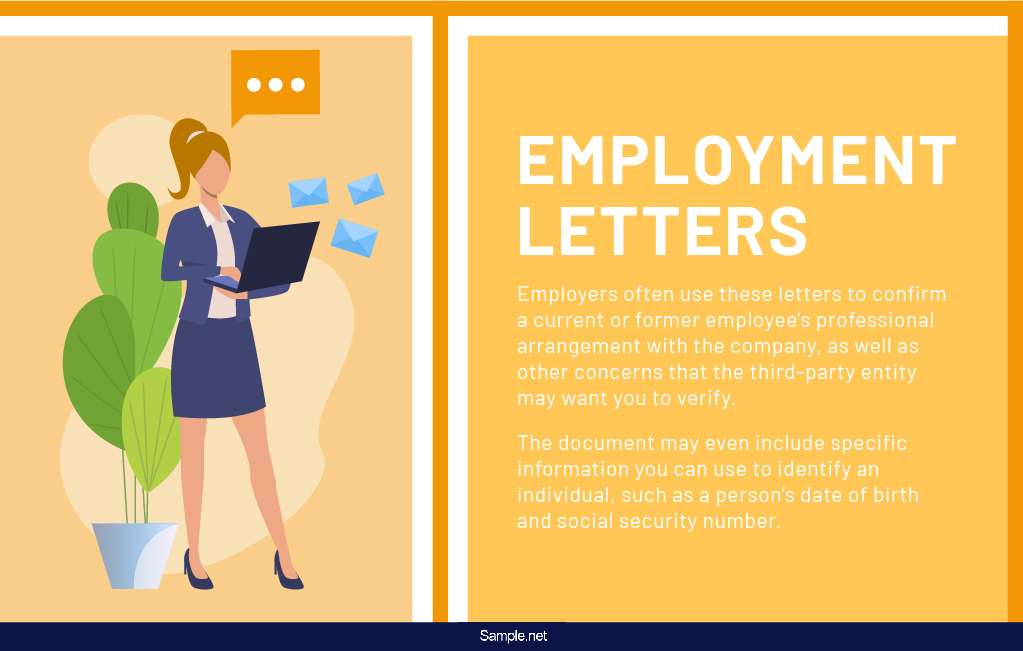
Why Is it Necessary?
These days, nearly everything must be in writing for reasons that all point to a business and a legal intention. Third-party verification is often necessary for further confirmation of a person’s claims regarding their employment, especially if there are certain items in the application that employers are very particular about. That’s because letters of employment are less risky compared to reference letters and recommendation letters, which don’t tell much about an employee’s specific work details. In other cases, people need employment letters to rent out a property, apply for a loan, or get a new job.
And since these letters are crucial for a multitude of reasons, you must take the time to understand what to emphasize in the letter to meet a request and make the right impression.
How Does It Differ from a Background Check or Reference Letter?
It’s easy to confuse employment confirmation or verification letters with background checks or references. A background check is a process that demands a more in-depth look into a person’s employment history, past addresses, and potential records of criminal activity. It goes into every minor detail of an individual’s private life and work experiences. On the other hand, a reference check takes a broader approach to the situation by discussing a fair amount of details about an employee’s personality and work ethics. Reference letters tend to pay more attention to who a person is as a professional, to ease the recruitment process for potential employers. You can also see more on Verification of Employment Letters.
And in contrast to the previous two, employment letters tackle nothing but the facts about an individual’s employment status, including their job title, years of employment, and other related details. That way, it stays focused only on what is necessary, making it an essential requirement in many formal applications. You can also see more on Proof of Employment Letters.
When Do You Write an Employment Letter?
While running a business, you might have employees who’ll request an employment letter for whatever purpose. And with the U.S. employment rate at 60.4% in 2018, as discovered by Statista, you can only imagine the number of employment letters produced every day. In most cases, employees use these letters to validate their work history for another party to acknowledge. Some common reasons for an employee to ask you to write an employment letter include the following:
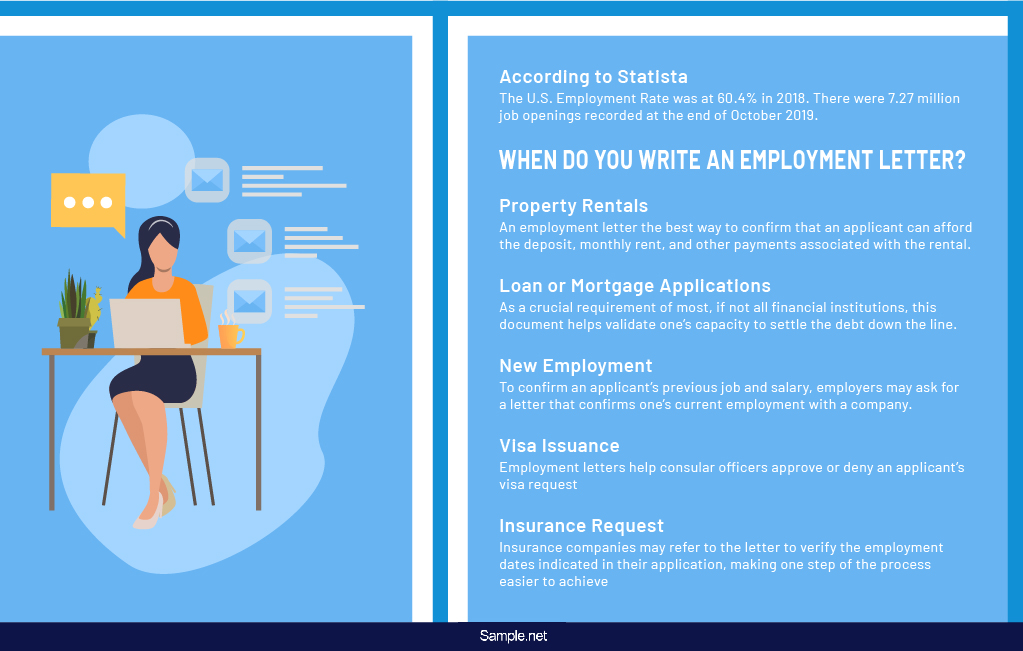
How Do You Construct a Good Employment Letter?
First things first: never allow an employee to compose an employment letter by themselves and under your name. It might sound tempting to leave all the work to someone else while all there’s left for you to do is to sign it—the easy way out isn’t always the best option. Moreover, slacking off will only put your company’s reputation at stake, especially if you fail to review and revise the letter when necessary. Letters like this have to be personal yet professional enough to get the right message across. Doing so will put you in control of what information readers have the right to receive based on what you share. You can also see more on Business Offer Letters.
For further directions on how to create an accurate proof of employment letter, refer to the guide below.
1. Gather the Essential Details
Be mindful of the details you note in your message. The company or firm you are writing to might have several requirements that you must include in the employment letter. Most letters should contain the name of the employee, their position in the company, the duration of their employment, as well as their annual income. Remember only to note down the information that was asked for; otherwise, you may want to avoid mentioning it in your letter. Be sure to ask the employee for a list of details that the recipient expects to find in the letter for reference. It’s best to prepare a checklist, so you don’t end up leaving anything important out. Knowing the specifics of the employment letter beforehand should help streamline the writing process.
2. Use a Business Format and Tone
Always consider your audience when writing any form of business correspondence. It’s also best to use a formal tone when dealing with employers, banks, financiers, and property managers. Using simple language and shorter sentences will always come as an advantage to you and the person reading your letter. Following the format of a business letter should also keep your letter professional and easy to read, as it creates a smooth flow of suitable material for your content. That would mean including an appropriate salutation at the beginning and a handwritten signature at the very end.
Staying relevant to the topic is another essential tip to remember to help you maintain the conciseness of your letter. Because a person’s college loan, mortgage loan, or future career move could be on the line, you have to make sure you’re pulling on all the right strings when crafting the letter.
3. Introduce Yourself
While you may be writing on behalf of the company, you’ll want to let the recipient know what authority you have to act as a representative. Hence, the first part of your letter should explain who you are, why you are writing, and what relation you have to the employee. You can also mention how long the subject has been working for the company or under your management. For instance, you can specify your position as the company’s HR manager and that you’ve been working with the employee for the past five years. Additionally, a brief introduction should help you gain the trust of the person you are addressing the letter to, so whatever claims you make may be advantageous to one’s case. You can also see more on Employment Verification Letter.
4. Stick to the Facts
Resist the urge to state your opinions about an employee unless the person you are writing to requests for one. It’s always a good idea to only include information that is verifiable by records. Not only does it make the content of your letter credible, but it also helps simplify your message for readability and conciseness. It should keep you from getting into legal trouble with either party as well. But if an employee can provide an employment form that you can fill in with data directly, then all the better. Employment information forms make the process a whole lot easier because of how the data requested remains specific to its primary purpose.
5. Include Company Information
Notice how most business letters come with a company letterhead?
Apart from building the letter’s formality, it also makes sense to include essential information about the company writing the letter by adding an official letterhead. If they have further questions or concerns that you can verify, recipients can quickly reach out to you through the details indicated in the letterhead. It typically consists of the company name, contact details, and mailing address that employers and banks can use as a reference. And so they know who to get in touch with if they feel the need to clarify specific details mentioned in the letter, don’t hesitate to write down your phone number and email address at the end of the employment letter.
6. Don’t Attach Formal Documentation
Avoid sending private employee documentation to another organization, including personnel records, individual reports, and other documents deemed confidential. You need to have the proper authority to share this information with someone else, especially if it can be damaging to the subject’s reputation. Or worse, it may even put your company at risk of releasing sensitive data that no other company or agency should be able to access. Be sure to verify this with the employee requesting the letter to determine what they can allow you to specify in the letter and what remains off-limits. You can also see more on Employment Probation Period Letter.
FAQS
What details are included in an employment letter?
Key details include the employee’s name, job title, salary, starting date, and terms of employment. It may also mention benefits and reporting structure.
Why is an employment letter legally important?
Employment letters serve as legal proof of the agreement between the employer and employee. They outline the terms of employment, reducing the risk of disputes and ensuring compliance with labor laws. You can also see more on Job Acceptance Letters.
What should I do if there’s an error in my employment letter?
If you notice an error, immediately contact your HR department to have it corrected. Always ensure the accuracy of employment documents to avoid complications.
Can an employment letter be used as evidence in disputes?
Yes, employment letters can be used as evidence in legal disputes related to job terms, salaries, or wrongful termination. It serves as formal documentation of the agreed-upon terms. You can also see more on Income Verification Letters.
How long should an employer keep copies of employment letters?
Employers should retain employment letters for the duration of the employee’s tenure and a few years after separation. This is crucial for record-keeping and compliance purposes. You can also see more on Confirmation Letter.
